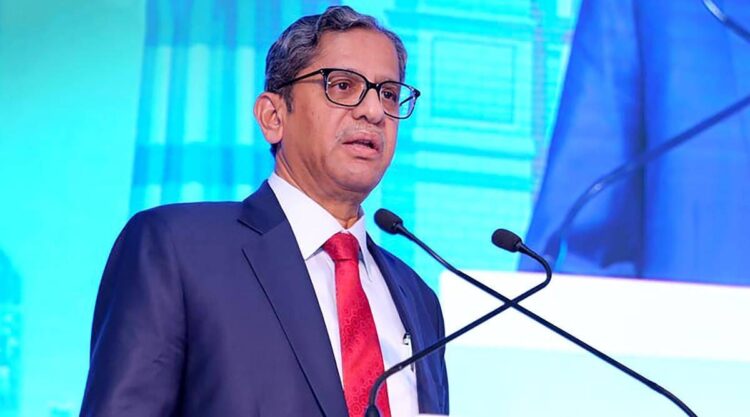Indian judiciary is recognised for giving paramount importance to the rule of law, said Chief Justice of India N V Ramana on Tuesday, as he emphasised that one can trust it “for its absolute independence and its inherent constitutional strength to treat all parties equally and equitably”.
Speaking at the annual meet of Indo-German Chamber of Commerce on the theme ‘Arbitration In A Globalised World – The Indian Experience’ in Dortmund, Germany, the CJI said, “The constitutional courts of India – the High Courts and Supreme Court – have the power to judicially review every act of the government. They can strike down any law that is not in tune with the Constitutional principles. They can also set aside the arbitrary measures of the executive.”
“Indian judiciary eternally guards the constitutional rights in the world’s largest democracy,” he added.
The CJI also sought to allay apprehensions over interference of domestic courts in the arbitration process and explained how Indian courts are “pro-arbitration”.
Also Read: Employer can’t arbitrarily terminate employee for giving false information: Supreme Court
“In recent years, there has been some apprehension in the minds of parties about increasing interference of domestic courts in the arbitration process. Let me assure you, Indian courts are known for their pro-arbitration stance. Courts in India assist and support arbitration and leave the substantive part of adjudication to the Arbitral Tribunal itself,” he said.
Indian courts, CJI Ramana pointed out, “have, over time, allowed broader scope for arbitrability of disputes” so as “to give impetus to arbitration as well as innovation”.
“This attitude of Indian courts has further increased the importance of international arbitration, particularly when it comes to countries like India and Germany,” he said.
The CJI stressed the need to develop more infrastructure for arbitration in developing countries so that the “geography of arbitration” is “balanced”.
Also Read: Supreme Court praises Wipro founder Azim Premji for this gesture
“Today, if we see the geography of international arbitration, it is mostly concentrated around the business centres of the developed world: Singapore, London, Paris or Stockholm,” he said. “This is despite the fact that most disputes are generated in the developing world. Due to a severe lack of resources and infrastructure, even parties from developing countries choose to resolve their disputes in these established resolution centres at severe cost to them. The geography of international arbitration needs to be balanced.”
He reminded that “it is of utmost importance that our dispute resolution facilities must match our investment inflows”. (Indian Express)






















